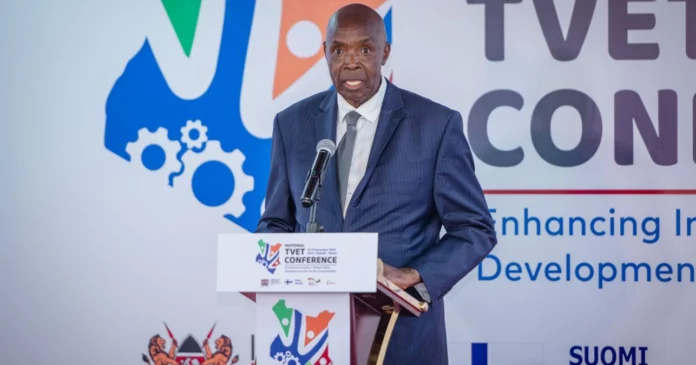Education CS Ezekiel Machogu has unveiled the details of a significant shift in Kenya’s education landscape. Under his leadership, the Ministry of Education is introducing an overhauled grading system for the 2023 Kenya Certificate of Secondary Education (KCSE) exam. This reform brings a fresh perspective to evaluating students’ academic achievements.
The new grading scheme will calculate the mean grade, focusing solely on two compulsory subjects: Mathematics and one language—either English, Kiswahili, or Kenyan Sign Language. Furthermore, it will consider each candidate’s top five subjects. The intentional shift from the traditional 8-4-4 grading system aims to foster inclusivity and expand opportunities for students pursuing Technical and Vocational Education Training (TVET) at diverse levels. Additionally, it facilitates admission into universities as well as diploma programs.
In response to perennial concerns regarding the previous grading system’s inherent limitations, this reform emerges. Often, it left students at a disadvantage by confining them within specific clusters under the 8-4-4 model and disregarding their strengths in certain subjects. This transformation towards an assessment that is more flexible and holistic aligns with the aim of acknowledging students’ diverse talents and capabilities.
Stakeholders, concerned about the credibility of high-stakes exams, proposed introducing an external assessment by the Kenya National Examinations Council (Knec) to address these issues. This external evaluation is anticipated to hold more significance in offering a comprehensive assessment of students’ overall performance. The Ministry emphasizes the importance of a balanced approach, combining formative and summative assessments. Mathematics and science courses will gauge numeracy skills, while English and Kiswahili will measure reading ability.
As the nation gears up for the 2023 KCSE exams, scheduled from October 23 to November 24, with rehearsals on October 19, Knec CEO David Njeng’ere has outlined logistical details. Exams will occur twice a day, and answer scripts will be collected with equal frequency, ensuring an efficient process. The commitment to maintaining the examination process’s integrity is underscored by stringent security measures, including restricted access to exam centers. On-site access is restricted to authorized personnel—specifically, center managers, supervisors, and invigilators.
Njeng’ere vehemently warns against malpractice, underscoring the importance of complying with established norms. His powerful admonition leaves no room for misinterpretation. The penalties for involvement in exam irregularities—a stark reminder of a zero-tolerance policy—are clearly outlined. CS Machogu echoes this sentiment and underlines not only the commitment but also asserts an active role by Ministry officials to guarantee that individuals implicated in cheating during exams face appropriate consequences.

how to check the subjects I have ✅